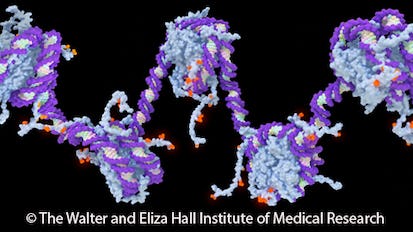- Level Foundation
- المدة 17 ساعات hours
- الطبع بواسطة The University of Melbourne
-
Offered by

عن
While the human genome sequence has transformed our understanding of human biology, it isn't just the sequence of your DNA that matters, but also how you use it! How are some genes activated and others are silenced? How is this controlled? The answer is epigenetics. Epigenetics has been a hot topic for research over the past decade as it has become clear that aberrant epigenetic control contributes to disease (particularly to cancer). Epigenetic alterations are heritable through cell division, and in some instances are able to behave similarly to mutations in terms of their stability. Importantly, unlike genetic mutations, epigenetic modifications are reversible and therefore have the potential to be manipulated therapeutically. It has also become clear in recent years that epigenetic modifications are sensitive to the environment (for example diet), which has sparked a large amount of public debate and research. This course will give an introduction to the fundamentals of epigenetic control. We will examine epigenetic phenomena that are manifestations of epigenetic control in several organisms, with a focus on mammals. We will examine the interplay between epigenetic control and the environment and finally the role of aberrant epigenetic control in disease. All necessary information will be covered in the lectures, and recommended and required readings will be provided. There are no additional required texts for this course. For those interested, additional information can be obtained in the following textbook. Epigenetics. Allis, Jenuwein, Reinberg and Caparros. Cold Spring Harbour Laboratory Press. ISBN-13: 978-0879697242 | Edition: 1 The course will re-open in 2022.الوحدات
Welcome and Introduction
1
Videos
- Course overview
4
Readings
- Course syllabus
- Teaching team
- Start of course survey
- Assessment and grading policy
Week 1 - Introduction to Epigenetic Control
1
Assignment
- Week 1 quiz - contributes 8% towards your final grade
6
Videos
- 1.1 Introduction to the concepts of epigenetic control
- 1.2 Mitotic heritability of epigenetic marks
- 1.3 Chromatin and the nucleosome
- 1.4 Chromatin compaction - heterochromatin versus euchromatin
- 1.5 DNA methylation at CpG islands
- 1.6 DNA methylation at intergenic regions and repetitive elements
1
Readings
- Week 1 and 2 resources
Week 2 - Epigenetic Modifications and Organisation of the Nucleus
1
Assignment
- Week 2 quiz - contributes 8% towards your final grade
9
Videos
- 2.1 Introduction to histone tail modifications
- 2.2 Histone acetylation and histone methylation
- 2.3 Chromatin remodelling
- 2.4 Histone variants
- 2.5 Noncoding RNAs - microRNAs
- 2.6 Noncoding RNAs - piRNAs
- 2.7 Noncoding RNAs - long noncoding RNAs introduction
- 2.8 Long noncoding RNAs Xist and HOTAIR
- 2.9 3D organisation of the nucleus and summary of epigenetic marks
1
Readings
- Week 1 and 2 resources
Week 3 - Dosage Compensation
1
Assignment
- Week 3 quiz - contributes 12% towards your final grade
12
Videos
- 3.1 History and background of X chromosome inactivation
- 3.2 Timing of random and imprinted X chromosome inactivation
- 3.3 Stages of X inactivation - counting and control of Xist expression
- 3.4 Control of Xist expression by pluripotency factors
- 3.5 Stages of X inactivation - choice of which X to inactivate
- 3.6 Stages of X inactivation - initiation and spreading of silencing
- 3.7 Stages of X inactivation - establishment of silencing
- 3.8 Stages of X inactivation - maintenance of silencing e.g. Dnmt1
- 3.9 Stages of X inactivation - maintenance of silencing e.g. Smchd1
- 3.10 X chromosome inactivation summary
- 3.11 Dosage compensation in flies and worms, compared with mammals
- 3.12 Lessons from the fly - position effect variegation and screening for epigenetic modifiers
1
Readings
- Week 3 resources (including required readings)
Week 4 - Genomic Imprinting and Epigenetic Reprogramming
1
Assignment
- Week 4 quiz - contributes 12% towards your final grade
6
Videos
- 4.1 Introduction to epigenetic reprogramming of the maternal and paternal genomes
- 4.2 Epigenetic reprogramming of imprinted genes and repetitive elements
- 4.3 Location of imprinted genes in the genome and bisulfite sequencing
- 4.4 Kcnq1 and H19/Igf2 ICR mechanisms of action and Beckwith Weidemann syndrome
- 4.5 Snrpn ICR mechanism, Prader Willi and Angelman syndromes
- 4.6 Summary of epigenetic reprogramming and imprinting
1
Readings
- Week 4 resources (including required reading)
Week 5 - The Influence of the Environment on Epigenetic Control
1
Assignment
- Week 5 quiz - contributes 12% towards your final grade
6
Videos
- 5.1 Disrupted epigenetic reprogramming in assisted reproductive technologies
- 5.2 Disrupted epigenetic reprogramming in somatic cell reprogramming and cloning
- 5.3 Introduction of transgenerational epigenetic inheritance, effects of the environment and sensitive periods in epigenetic control
- 5.4 The Dutch Famine human epidemiological studies and the Developmental Origins of Adult Health and Disease
- 5.5 Human epidemiological studies on the Overkalix cohort, grandparental effects and possibility of transgenerational epigenetic inheritance in humans
- 5.6 Extension lecture: Interview with Dr Andrew Keniry
1
Readings
- Week 5 resources (including required readings)
Week 6 - Mechanisms of Environmental Influence on Epigenetic Control and Transgenerational Epigenetic Inheritance through the Gametes
1
Assignment
- Week 6 quiz - contributes 12% towards your final grade
8
Videos
- 6.1 Mouse and rat studies on paternal effects of chemical exposure, effects of maternal behaviour on epigenetic makeup
- 6.2 Transgenerational epigenetic inheritance via the gametes
- 6.3 The Agouti viable yellow allele in mice
- 6.4 Environmental effects on the Agouti viable yellow allele
- 6.5 The Axin fused allele in mice and metastable epialleles
- 6.6 Potential mechanisms of transgenerational epigenetic inheritance: incomplete epigenetic reprogramming
- 6.7 Paramutation in plants and paramutation-like effects in mice
- 6.8 Constitutional epimutation in humans - not transgenerational epigenetic inheritance
1
Readings
- Week 6 resources (including required readings)
Week 7 - Cancer Epigenetics
11
Videos
- 7.1 Overview of cancer epigenetics
- 7.2 Hypermethylation of CpG islands in cancer
- 7.3 Hypermethylation of sets of CpG islands in cancer
- 7.4 Hypomethylation genome-wide in cancer
- 7.5 Altered histone modifications in cancer
- 7.6 Long range epigenetic alterations in cancer and alterations to nuclear architecture
- 7.7 Altered expression on piRNAs and long noncoding RNAs in cancer
- 7.8 Mutations in epigenetic modifiers in cancer
- 7.9 Drugs that target the epigenetic machinery as chemotherapeutics
- 7.10 Extension lecture: Aging - Part 1
- 7.11 Extension lecture: Aging - Part 2
1
Readings
- Week 7 resources (including required readings)
Final Assessment
1
Peer Review
- Epigenetics and Cancer - contributes 36% towards your final grade
2
Readings
- Academic integrity
- End of course survey
Auto Summary
Unlock the mysteries of gene expression with the "Epigenetic Control of Gene Expression" course from Coursera. Dive into the cutting-edge domain of Science & Engineering, guided by expert instructors. Explore how epigenetics influences gene activation and silencing, and its impact on diseases like cancer. This foundational course covers essential epigenetic phenomena in mammals, the environment's role, and therapeutic potentials. With comprehensive lectures and readings, learners have flexible subscription options: Starter, Professional, and Paid. Ideal for those eager to grasp the dynamic field of epigenetics.

Dr. Marnie Blewitt


